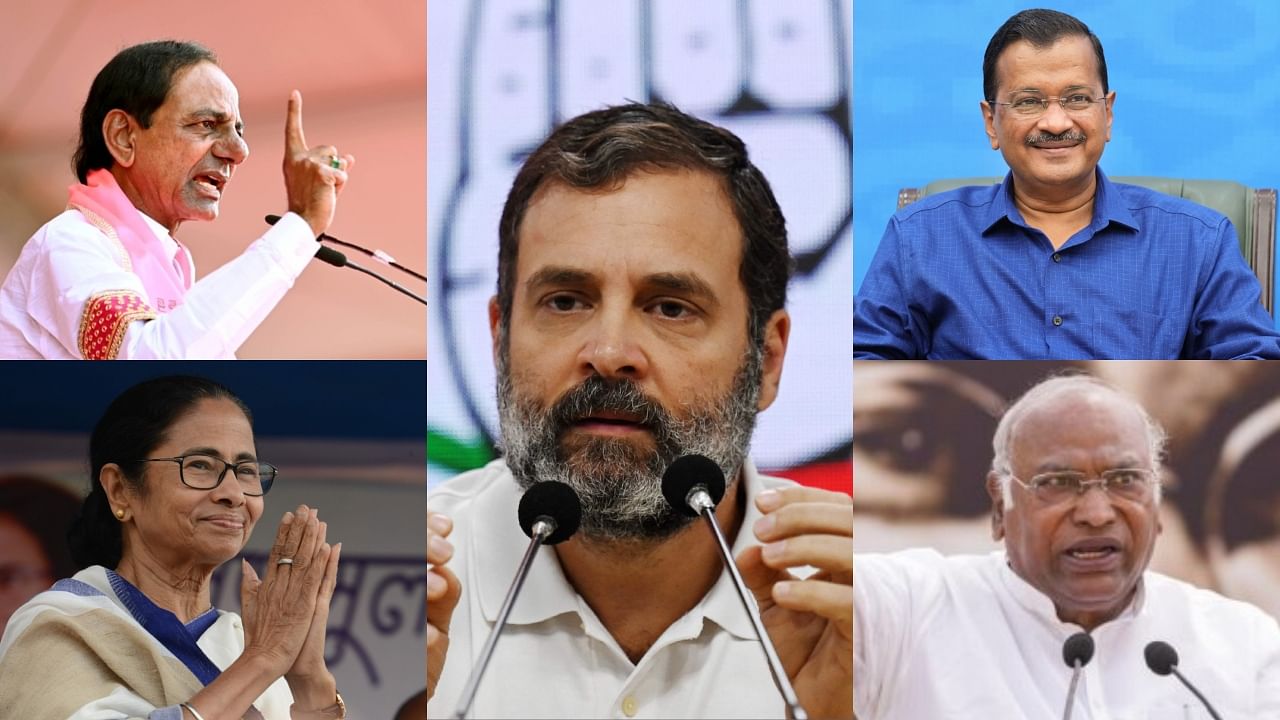
Congress leader Rahul Gandhi’s disqualification from Lok Sabha, coming on the heels of his conviction in a 2019 defamation case, makes clear the writing on the wall for the Opposition: unite or perish.
The knives are out in the open. Whether or not the Opposition survives the cuts would largely depend on its seriousness to oust the current dispensation from the Centre. Importantly, it would depend also on Opposition leaders’ willingness to put aside personal ambitions to push back the onslaught of undemocratic, punitive moves by the Bharatiya Janata Party (BJP)-led National Democratic Alliance (NDA) government.
If Gandhi’s conviction is not cancelled or stayed by a higher court, the Congress leader will be barred from contesting elections for six years after the two-year sentence ends.
That the Narendra Modi-led government is not constrained by scruples in getting vocal Opposition leaders out of its way has been evident for a long time. The pace of detentions and arrests, quickening after the 2019 Lok Sabha elections, has accelerated at an alarming rate. Yet, notwithstanding the worsening situation, the Opposition has failed to close ranks, even as the 2024 general elections is staring them in the face.
Given this, the stringent court verdict against Gandhi and his ouster from Parliament could propel scattered opposition parties toward a common ground. Some hopeful signals to this effect have come from the Aam Aadmi Party (AAP) leader and Delhi Chief Minister Arvind Kejriwal, who, contrary to his usual stance, has voiced his support for Gandhi. Trinamool Congress (TMC) leader and West Bengal Chief Minister Mamata Banerjee, too, has condemned Gandhi’s disqualification. Banerjee’s statement is important as she has, in recent times, publicly criticised the Congress for trying to catapult itself to lead the opposition parties in the fight against the BJP. Telangana Chief Minister and Bharat Rashtra Samithi (BRS) President K Chandrasekhar Rao, too, condemned Gandhi’s disqualification.
The spiral of arrests and raids by investigating agencies could be a catalyst for Opposition unity. No Opposition leader is safe in this toxic environment. Implicated in an alleged liquor policy scam, Delhi’s Deputy Chief Minister Manish Sisodia is in jail, with no resolution in sight. Satyendar Jain, another AAP leader and former minister, now accused of money laundering, has been in jail since June 2022. Similarly, the noose has tightened around the TMC on this front.
Several of Banerjee’s top aides are in jail. Nephew Abhishek Banerjee has been summoned by investigating agencies on several occasions. Rashtriya Janata Dal (RJD) leaders Lalu Prasad and Tejashwi Yadav have repeatedly been summoned by the Central Bureau of Agency (CBI) and the Enforcement Directorate (ED).
The ED has also summoned BRS leader and Rao’s daughter K Kavitha for questioning in the alleged liquor policy scam in Delhi.
On March 24, 14 opposition parties approached the Supreme Court, seeking the court’s intervention against the “misuse” of investigating agencies. The petitioners argued that “investigating agencies such as CBI and ED are being increasingly deployed in a selective and targeted manner with a view to completely crush political dissent and upend the fundamental premises of a representative democracy.”
The discrepancy between numbers of cases and convictions is stark. Under the Prevention of Money Laundering Act, 2002 (PMLA), 23 convictions have been secured, even as the number of cases registered by the ED under the PMLA have shot up from 209 in 2013-14 to 981 in 2020-21 and 1,180 in 2021-22.
Opposition parties are now beginning to hit the streets. But the question of public endorsement for such actions remains unanswered. Many countries would have already witnessed public outrage at such systemic corruption and institutional manipulation. In India, by contrast, society seems impervious to increasing injustice, cultures of silence, and the erosion in institutional integrity. Such largescale apathy has only strengthened the Modi government.
As academic Pratap Bhanu Mehta asks, “But has the psychology of tyranny now been internalised by enough Indians to make resistance more difficult? India still has the potential for protest on many issues. But what is increasingly in doubt is whether India wishes to resist deepening authoritarianism.”
A significant challenge for the Opposition is to persuade the people to respond to a different imagination, built around a fresh narrative that can counter the ideology of hyper-nationalism and majoritarian communalism. In this context, the Opposition’s campaign narrative for the 2024 elections will be as important as its success in uniting forces.
Given the large-scale shift of OBC and Dalit votes to the BJP, forming such a coalition poses a tough challenge. So far, Gandhi has unequivocally and consistently countered the RSS-BJP ideology. In fact, it can be argued that he has been the sole voice among mainstream politicians, in this regard. But effecting transformations of this scale are beyond the scope of one person.
With general elections barely a year away, time is of the essence. During his Bharat Jodo Yatra, Gandhi’s insistence that the march not be linked to elections raised concerns. It is indeed true that contestations over ideology must move beyond electoral victories. Countering any ideology, especially when it has become dominant and popular across a cross-section of society, is an arduous process — one which can’t be given up on after winning an election. At the same time, electoral success will contribute in no small measure to stemming the tide of tyranny on the rise today.
(Monobina Gupta is a Delhi-based journalist.)
Disclaimer: The views expressed above are the author's own. They do not necessarily reflect the views of DH.